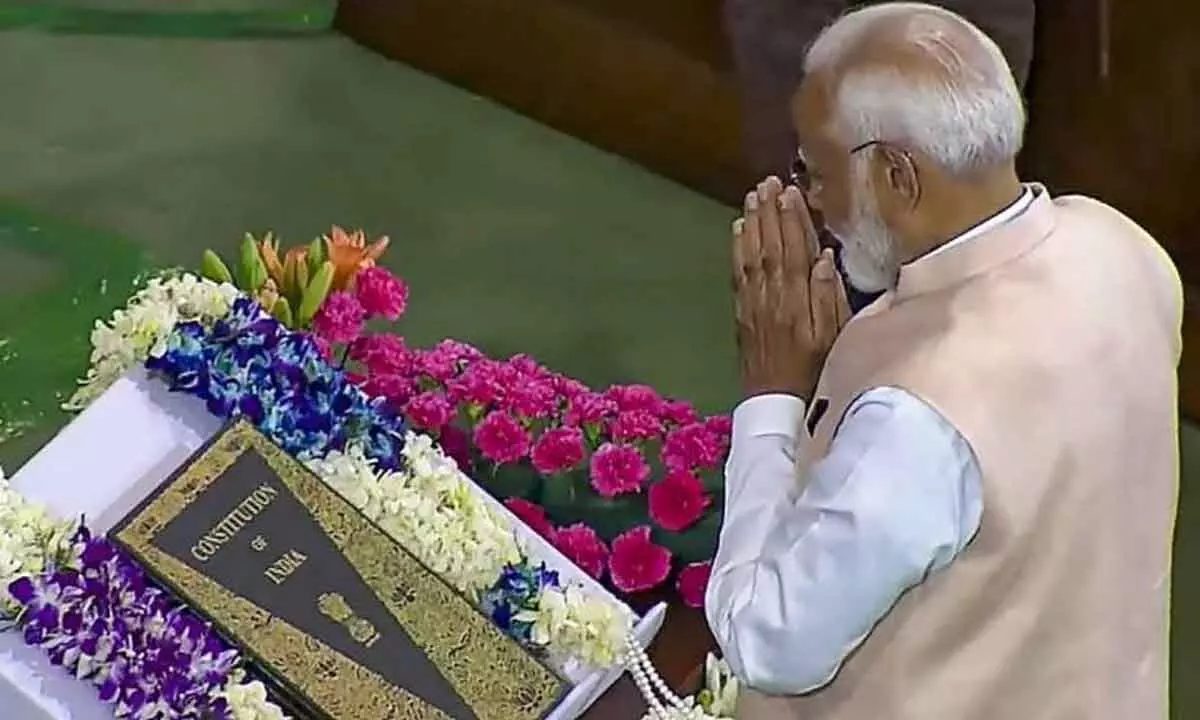Task cut out for Modi 3.0; Agenda set for the next five years
Both public and private sector should endeavour to enhance economic activities in far-flung areas
image for illustrative purpose

Agriculture production, which is showing lower growth due to climate change, has been affecting the income of farmers and this needs to be strengthened with both government and private sector investment
The Lok Sabha seats were expected to go in favour of the ruling party, which had planned a 100-day program schedule that included many new initiatives and far reaching reforms to take India towards Vikasit Bharat by 2047.
Although, all the earmarked reforms and progressive steps are expected to be taken by the NDA-government that has been re-elected, the fact remains that the mandate has been far less than expected and as against a single party, the Bharatiya Janata Party (BJP, getting a majority number of 272, it is currently dependent on a coalition of parties with more than 291 with the INDIA bloc managing 234 seats and others getting 18.
This may require some tweaking of the 100 days program and there should be more concern and mitigation efforts towards the pain experienced at the level of the bottom of the pyramid in terms of inclusivity, a more sound economic empowerment, providing and enabling opportunities for employment, creating more economic activities in rural areas and underserved areas as well in urban slums and migrants, among others.
Along with subsidies, free food, employment guaranteed schemes, there is requirement that both public and private sector should endeavour to enhance the economic activities at far flung areas and rural development both with profitable agriculture and allied activities and micro and medium industries cluster to provide employment activities. The Centre must also focus on venturing into new clusters and new industrial zones that are labour-intensive. They should facilitate skill development to the young qualified youth, which will provide new impetus for rural uplift and purchasing power enhancement which will supplement agro related income and rural consumption demand will increase.
The focus on agricultural food processing industries both for domestic and export are to be given special fillip. Rural agro products are to be developed as Brand India, especially to cater to the export market to achieve high value realisation. Agriculture production, which is showing lower growth due to climate change, has been affecting the income of farmers and this needs to be strengthened with both government and private sector investment by enhanced productivity of agriculture and providing uninterrupted power and water resources and modern agro technology as India has to taking care of agriculture production for large growing population of our country but also for export market. Due to excessive rainfall, heat or lack of water leading to drought has affected the farmers very badly in various states and their pain removal has to get adequate attention from the Centre and the respective states. The aim of enhancing and doubling farmers income in five years has to be taken up in earnest and ground level positive impact has to be felt.
Micro and small scale industries, which contribute substantially towards GDP and exports with larger employment engagement, had suffered during the Covid-19 pandemic. MSME sector needs further help to expand their contribution to GDP and exports with adequate equity support.
SIDBI and banks have to create a special fund and provide venture capital support and seed capital for enhancing capacities for product development and research, for adopting new technology and upgrade existing technology, employing specialised skilled human resources, improving governance, providing timely advice on proper financial management, marketing support in international markets, diversifying into the export markets, participation in international fairs and exhibitions, creating eco system for top branded Indian MSME's products in domestic and international markets. Apart from these the government must ready MSMEs for IPOs, private equity placement, getting international development banks and special assistance and aid package for taking ESG and climate change in MSMEs for supply chain value creation.
Women participation and women empowerment, women engagement in economic growth is another area, which has to get enhanced attention by the government.
Economic empowerment through tiny industries, cottage industry, small trade and e commerce, digital and technology related activities in rural and semi-urban areas, slum development with fully women engagement activities related to exports and fashion will lead to their productive engagement. Women participation has to be enhanced to 50% as it will be advantageous for reducing inequality of income and also boost savings.
In conclusion, along with big bang reforms, economic reforms, financial sector reforms, there is a need to focus on ease of doing business, continuing the digital transformation, special efforts to focus on utilisation of demographic dividend, youth empowerment, skill development, boosting farmers’ income, women skilling and their productive engagement. The per capita income improvement at the low-income and middle income levels and reducing inequality of income by suitable economic steps, short, medium and long term development plans will lead India towards Vikasit Bharat by 2047. Getting these priorities and executing them with resolve involving all stakeholders is the need of the hour for Modi 3.0.
(The author is former Chairman & Managing Director of Indian Overseas Bank)

